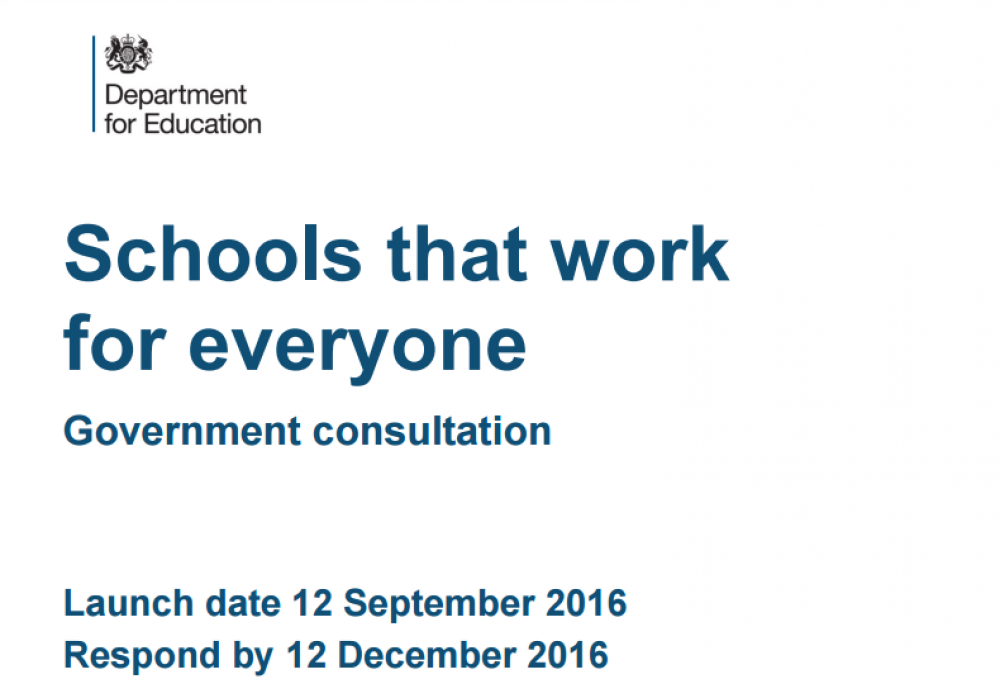Schools Week has rounded up the full list of policy recommendations from the government’s grammar schools green paper published today.
The proposals are broken down into four categories: selective schools, independent schools, universities and faith schools.
Get the printable one-page pdf version here
Selective schools
1. Selective schools can expand on the explicit condition they provide support to ensure “good quality non-selective places locally”. Conditions for expansion will be chosen from a range including:
Take a proportion of pupils from lower-income households
Establish a new non-selective secondary school
Establish a feeder primary in low-income area
Partner with existing non-selective school or ensure opportunities to join the selective school at different ages, such as 14 and 16 – as well as 11
2. The government will set up a £50 million fund to help existing grammar schools to expand
3. Allow new selective schools, which would have to be set up in response to local demand. They would have flexibility to select 100 per cent of their intake on the basis of ability
4. Allow existing non-selective schools to become selective, as long as certain criteria met – including meeting local demand
5. Selective schools that do not deliver good or outstanding education alongside their new education places could be stripped of access to additional funding streams for new pupils, removing their right to select by ability or be barred from further expansion
6. Multi-academy trusts will be encouraged to select within their trust and set up a single centre to educate their “most able” pupils, dubbed a “centre of excellence”
7. Existing selective schools will be required to engage in outreach activity, including teacher and pupil exchanges with local schools
8. Selective schools must have in place strategies to ensure fair access – legislation would require selective schools to prioritise, or set aside places, for pupils of lower household income in oversubscription criteria
Independent schools
9. Those with the capacity and capability should meet one of two expectations to keep their charitable status:
They should sponsor academies or set up a new free school in the state sector. The government would expect the school to be good or outstanding within a certain number of schools
Or
Offer a certain proportion of places as fully-funded bursaries to “those who are insufficiently wealthy to pay fees”.
The document adds: “We expect this figure to be considerably higher than that offered currently at most independent schools”.
10. Smaller independent schools that can’t provide full sponsorship will be asked to fulfil one or more of the below criteria:
Provide direct school-to-school support to state schools
Support teaching in minority subjects that state schools struggle to make viable – examples given are further maths, coding and languages such as Mandarin, and classics
Ensure their senior leaders become directors of multi-academy trusts
Provide greater expertise and access to facilities
Provide sixth-form scholarships to a proportion of pupils in each year 11 at a local school
Universities
11. Universities that want to charge higher fees must set up a new free school or sponsor an academy in the state system.
Faith schools
12. Remove 50 per cent cap on faith-based admissions in free schools. But faith schools must meet the following criteria:
Prove through consultation and parent signatures that parents of other faiths would be happy to send their children to the school
Establish twinning arrangements for other schools not of their faith
Consider setting up mixed-faith multi-academy trusts
Consider placing an independent member or director of different faith or no faith on the governing body
Want to share with others in a meeting? Print our one-page downloadable summary








Do governments understand that Grammar Schools get better results, not because they are better but because they select brighter children?
What choice does this give families with children who are not 100% likely to pass the entrance exam and who do not have a religion?
Bringing back Grammar schools makes Teresa May’s speech in Downing Street claiming to aspire to “a country that works for everyone” a deception. Their reintroduction will serve those who already have an advantage in life and they will further entrench our deeply unfair and unequal society.
This must be the daftest proposal for education for years. Why all the focus on grammar schools when faith schools are far more worrying.
How can an all Catholic or Muslim school be a good thing for creating community cohesion. Education must break down barriers not erecting them. A cynics view could be that May is looking to bolster support from these communities.
Just caught up with this – was abroad when it came out. One question – point 9, second paragraph: should this read “within a certain number of years”?
Thanks.